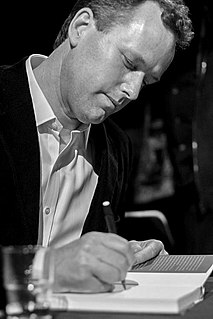A Quote by E. B. White
The main thing I try to do is write as clearly as I can. Because I have the greatest respect for the reader, and if he's going to the trouble of reading what I've written -- I'm a slow reader myself and I guess most people are -- why, the least I can do is make it as easy as possible for him to find out what I'm trying to say, trying to get at. I rewrite a good deal to make it clear.
Related Quotes
The desire to be liked is acceptable in real life but very problematic in fiction. Pleasantness is the enemy of good fiction. I try to write on the premise that no one is going to read my work. Because there's this terrible impulse to grovel before the reader, to make them like you, to write with the reader in mind in that way. It prevents you doing work that is ugly or upsetting or difficult. The temptation is to not be true to what you want to write and to be considerate or amusing instead. I'm always trying to fight against the impulse to make my readers like me.
As soon as I start to write I'm very aware, I'm trying to be aware that a reader just might well pick up this poem, a stranger. So when I'm writing - and I think that this is important for all writers - I'm trying to be a writer and a reader back and forth. I write two lines or three lines. I will immediately stop and turn into a reader instead of a writer, and I'll read those lines as if I had never seen them before and as if I had never written them.
I was trying to make you jealous!" Simon screamed, right back. His hands were fisted at his sides. "You're so stupid, Clary. You're so stupid, can't you see anything?" She stared at him in bewilderment. What on earth did he mean? "Trying to make me jealous? Why would you try to do that?" She saw immediately that this was the worst thing she could have asked him. "Because," he said, so bitterly that it shocked her, "I've been in love with you for ten years, so I thought it seemed like the time to find out whether you felt the same about me. Which, I guess you don't.
I'm speaking to someone I'm trying to get to fall in love with me. I'm trying to speak intimately to one person. That should be clear. I'm not speaking to an audience. I'm not writing for the podium. I'm just writing, trying to write in a fairly quiet tone to one other reader who is by herself, or himself, and I'm trying to interrupt some silence in their life, which is utterance.
I was always a slow reader, from the very beginning. I remember in first grade our teacher divided us into groups, and I was definitely in the slow group. She didn't call it that, but everybody in the class knew. But I still loved reading. Being a slow reader affected my grades in school, but it didn't affect my love for reading. I still loved going to the library, and I still loved reading books.
In my couple of books, including Going Clear, the book about Scientology, I thought it seemed appropriate at the end of the book to help the reader frame things. Because we've gone through the history, and there's likely conflictual feelings in the reader's mind. The reader may not agree with me, but I don't try to influence the reader's judgment. I know everybody who picks this book up already has a decided opinion. But my goal is to open the reader's mind a little bit to alternative narratives.
With the audience I write for, I want to make sure that the reader is eagerly turning every page. I want each of my books to be an absorbing reading experience, an authentic piece of literature. The worst thing that can happen is for a book to have a chilling effect on the reader, to have a kid pick it up and look at a bunch of footnotes and think, No, I'm not going to read this, it's too intimidating.
When I think about the things that cause me pain or the things that cause me trouble or frustration, it's not people asking for my autograph; it's people breaking my heart. That happens to you whether you've sold millions of records or whether you're taking classes at college. You're going to believe people when they say that they love you. I don't leave out details when I write songs about that. I try to make my songs as personal as possible because, ultimately, my music started out as just trying to turn my diary entries into something that was a piece of music. And that has never changed.




































